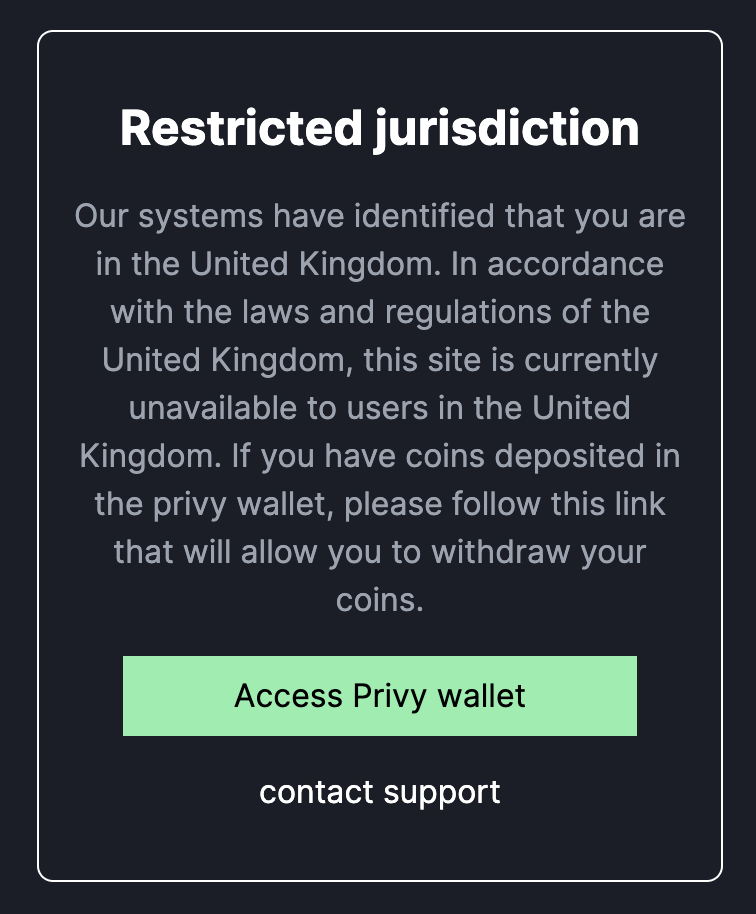After fueling frenzied demand for meme coins, pump.fun has been banned in the U.K.
A pithy statement confirms the website is now being blocked for British users — and while it suggests the restrictions are temporary, the platform’s founder says they’re permanent.
My reaction to all of this, dear reader? Good.
I am delighted that a country has taken swift action against a company that’s causing reputational harm to the crypto industry.
I am ecstatic if it means just one inexperienced investor is spared from the heartbreak and anguish of seeing their hard-earned savings vanish before their very eyes.
And I am optimistic that other nations will follow where the U.K. leads — and clamp down on a website that’s become a cesspit of speculation and greed.
The ban came after the Financial Conduct Authority issued a warning, and said pump.fun was not authorized to operate in Britain.

That’s pretty awkward considering that the business running this website, Baton Corporation Ltd, is registered in the U.K.
There will be some degens who are outraged by this news — and point to the ban as another example of regulators taking a heavy-handed approach against crypto firms.
But it’s disingenuous to compare pump.fun to law-abiding crypto exchanges that have faced roadblock after roadblock as they try to offer services to their customers.
Only a couple of weeks ago, this website faced a backlash after its livestreams were used to broadcast threats of gun violence and animal abuse.
“Meme coin promoters” trivialized suicide while trying to propel their tokens to multimillion-dollar market caps.
Other opportunistic traders locked themselves in dog cages, or sat on a toilet for days, in a desperate bid to get attention.

The crypto industry tends to have a laidback attitude and a high tolerance for wacky behavior — but these dangerous stunts proved a bridge too far for many investors on X.
And even though this sector bristles at the mere mention of censorship, pump.fun was begged to take the livestream feature down before someone was seriously hurt.
It eventually did — blaming the catastrophic lapses in moderation on being too darn popular. Replies were turned off the X post to prevent critics from piling on.
Alon Cohen, pump.fun’s founder, hasn’t tweeted about the debacle at all — instead reposting congratulatory messages about how “revolutionary” the website is.
my ultimate goal is for pump dot fun to be the most fun place on the internet
if I don't achieve this then I have failed— alon (@a1lon9) February 24, 2024
Tech companies grow fast and make mistakes. Those that do slip up shouldn’t automatically be banned and banished from the internet forever.
But from start to finish, pump.fun has been a textbook example of a site that’s handled a crisis badly, and regulators need to step up.
Meme coin websites represent gambling in its purest form. Someone who apes into a token might as well be putting $5,000 on black at a roulette table.
But while casinos have strict rules and safeguards for consumers, pump.fun does not.
Done well, regulation isn’t about stifling innovation or interfering in our lives — instead, it’s about offering protection from things that have the potential to hurt us.
Countless people have ended up losing their savings and getting into debt while trying to chase the high of snapping up a meme coin before it goes 1,000x on pump.fun.
Many of those who end up dabbling in these digital assets have little understanding of the market, the intricacies of blockchain technology, or even what a rug pull is.
And unfortunately, many of those creating these meme coins take advantage of this inexperience — promising vast wealth to naive investors while lining their own pockets.
Regulation is often reactive rather than proactive, meaning action ends up being taken months or years after the damage has been done.
This ends up being carried out by agencies that lack the technical wherewithal to understand what’s going on, and how consumers are being put in danger.
Now is the time for countries to sit up and pay close attention to the harm that’s taking place on pump.fun, before things get worse.
Disclaimer: The opinions in this article are the writer’s own and do not necessarily represent the views of Cryptonews.com. This article is meant to provide a broad perspective on its topic and should not be taken as professional advice.
The post Opinion: More Countries Should Ban Pump.fun appeared first on Cryptonews.